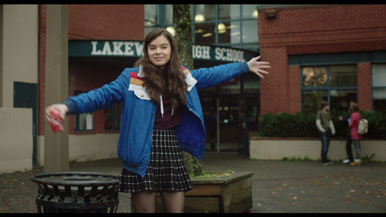Movie Review: Edge of Seventeen
By Ben Gruchow
December 19, 2016
BoxOfficeProphets.com

You might not know this from the opening, which initiates in medias res and presents the film more as an heir apparent to 2007’s Juno than anything else. The first person we see is Nadine (Hailee Steinfeld), as she barges into her almost-empty high-school classroom during lunch, confronts the teacher, and announces that she’s going to kill herself in any number of ways. The teacher, played by Woody Harrelson, will not be outdone; when she finishes her tirade, he calmly shows her his own suicide note. Glib and overwritten, this scene is, and we think to ourselves that we’ve seen this territory already in any number of teen films with snark and little substance. But this film is giving hints and playing cards we don’t know about yet.
After that opening scene, we back up: Nadine is a second-grader, and meets the classmate who is still her best/only friend to this day. This is Krista (Haley Lu Richardson). Nadine also has the pleasure of growing up with a brother who is seemingly friends with everyone and successful at everything (Darian, played by Blake Jenner), and gains all of the positive attention from their mother Mona (Kyra Sedgwick). Nadine’s father is the only family member she seems to get along with, but he’s not in the picture for very long. And as a teenager, the hints that she may not be the most engaging person to have around accumulate: at parties, at school - and most disruptively, in a moment where she discovers Krista in a compromising situation with her brother.
It’s with that compromising situation, actually, that The Edge of Seventeen begins to show its true colors and deviate away from the model of the irreverent teen comedy; rather than simply show this development from Nadine’s point of view, we’re given a few moments with Darian and Krista beforehand, as they clean up the remnants of a party and recognize a mutual attraction. This moment took me by some surprise; rather than accepting the positioning of these two as supporting characters in a Nadine-centric film, they’re given the chance to breathe and engage with us, and it makes their discovery by Nadine - which we know is coming - feel authentic, and therefore more suspenseful. Even more impressive is the brevity that this occurs in; we’re really talking about a minor development in the story here, and yet Jenner and Richardson find the right notes and their characters earn our attachment and sympathy naturally.
From this point, the movie charts a course that we’re well-versed in by now: there is Nick (Alexander Calvert) as Nadine’s longtime romantic interest at school, and there is Erwin (Hayden Szeto) as the shy guy who sits next to her in class and has clearly noticed her, even as she’s only noticed him in the context of a dog that you feel bad for. Krista’s fling with Darian will drive a wedge between her and Nadine; we’ll see a deepening crisis of conscience and increase in wrong choices, a moment of reckoning, and we know that things will more or less work out all right in the end. I am not spoiling anything that you shouldn’t already know from looking at the trailer or a basic plot synopsis, or if you’ve seen The DUFF, Mean Girls, Easy A, or any of the other upper-tier teen dramedy films. What elevates this film above those - and indeed, above every other example of the genre I can think of - is the character depictions and reactions to these developing circumstances, and how quickly the movie evolves from processed snark to empathy.
The key there is the use of empathy. Most films will go for sympathy, because most films take care to have a sympathetic protagonist, one that reflects the better thoughts and feelings of the viewer. Not here. Nadine is leagues beyond Juno or Cady or Bianca in her defensiveness; offhand, I cannot remember the last time a mainstream studio release presented us with a protagonist this lacerating. The movie dispenses in short order with giving us much of an obvious reason to root for her, and we are required to grasp the undercurrent of indignant confusion and anger in Nadine before we can start to accept her and interpret the events in the movie on her behalf. The gateway to doing this, I think, are her scenes with Erwin. Steinfeld and Szeto have a sweet and natural chemistry together, and it’s remarkable how well the narrative expands to include him without taking its focus off of Nadine even momentarily.
There is a tendency in movies to accelerate off the starting line with a sharp and defined mindset and then suffer some degree of identity crisis around their midpoint, as the filmmakers seem to decide that they don’t have much substance to hang the story on, and the characters are yoked onto a different track well in advance of what feels natural. Comedies suffer explicitly from this, as humor gives way to some degree of earnest proselytization toward the viewer. The last studio release to follow through on making the protagonist unsympathetic to a really significant degree was probably Bridesmaids back in 2011. Even that movie, though, kept its arc in the realm of comedy, with the ultimate catharsis of the character played for humor - gracious humor, true, but still humor.
The Edge of Seventeen goes further in developing a difficult protagonist, and it will turn off some viewers who are looking for a lighter comedy. By the time the final realization arrives, though, we realize that it’s wholly earned. This is an immediate classic in its genre, playing out a familiar scenario in unexpected and immensely satisfying ways; it takes chances with its character motivations and actions from the beginning, and doesn’t once step wrong. It’s one of the year’s best films.